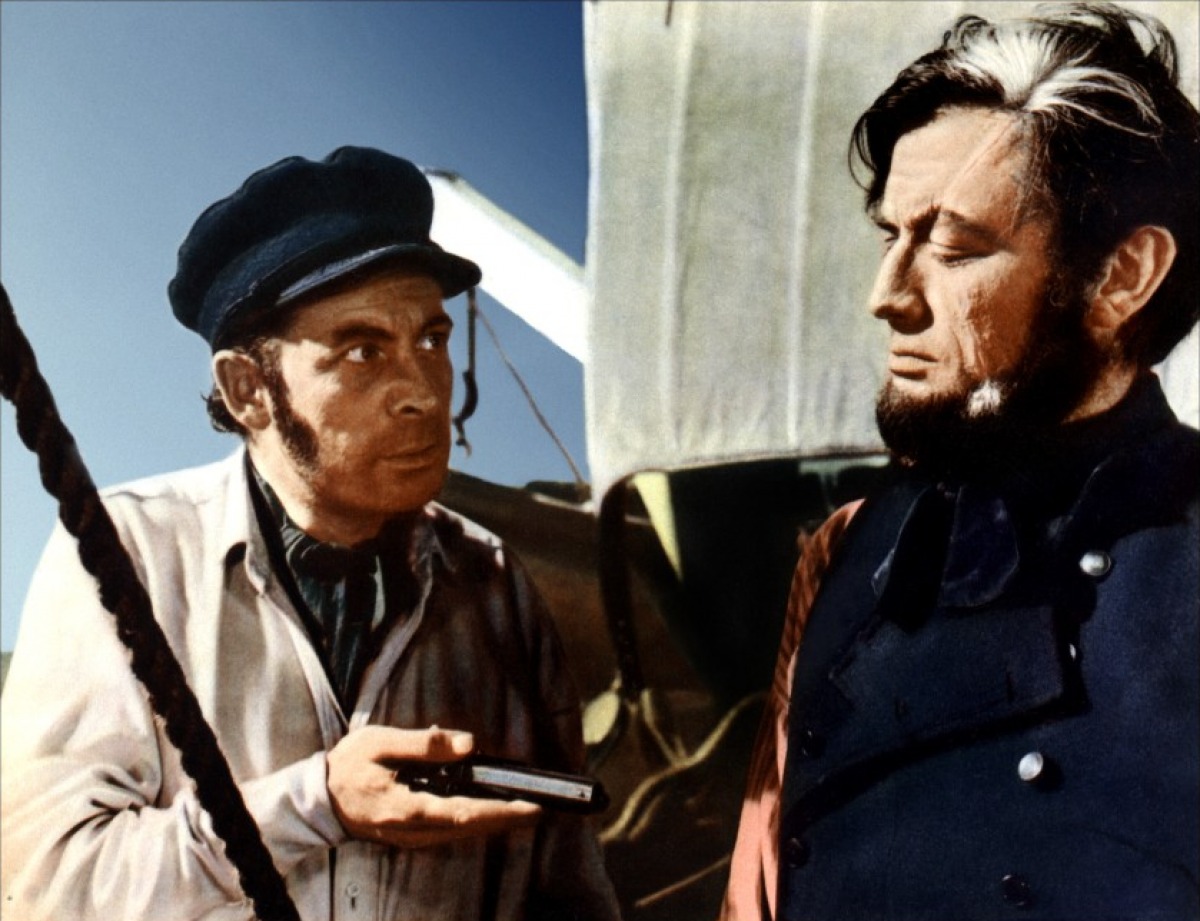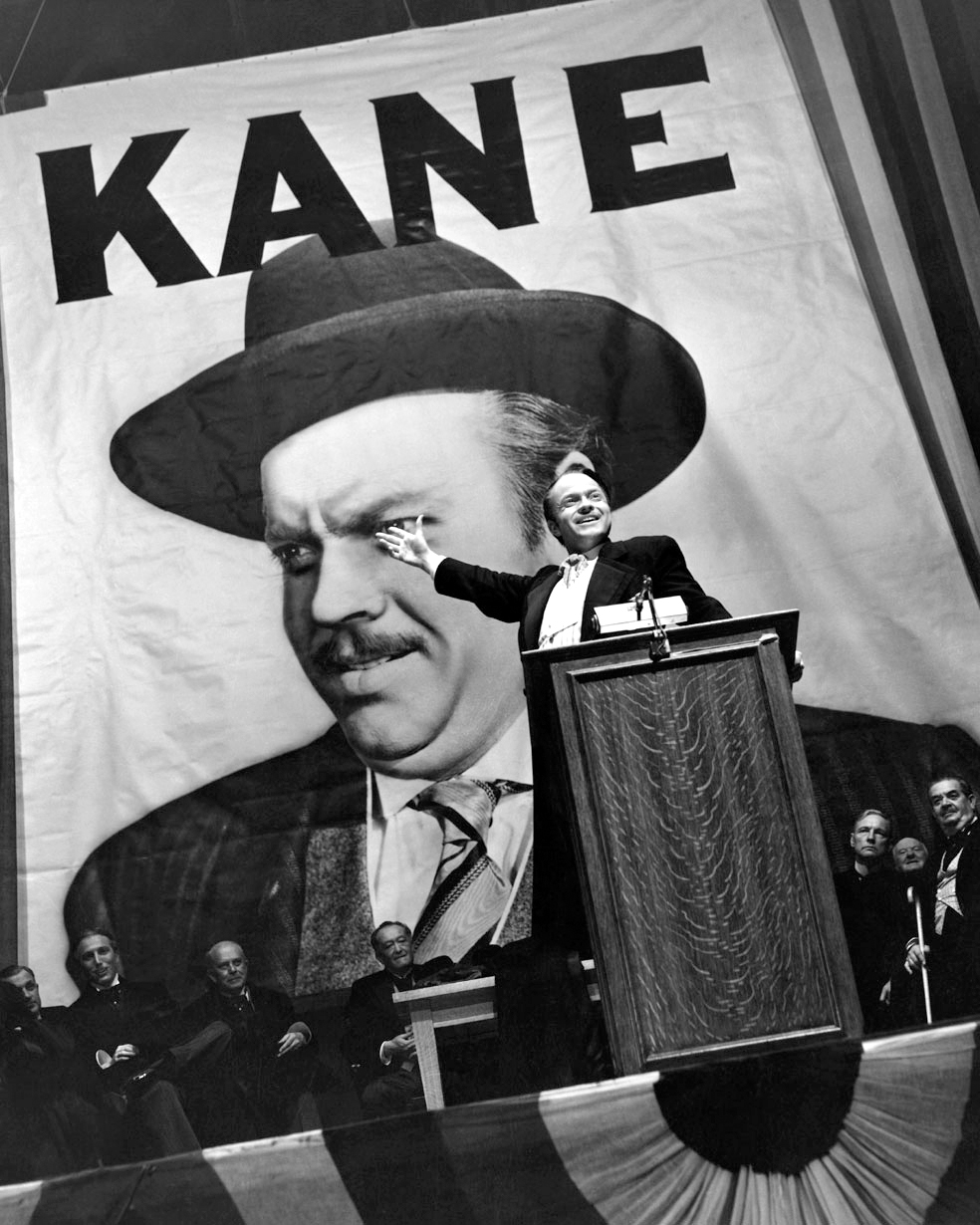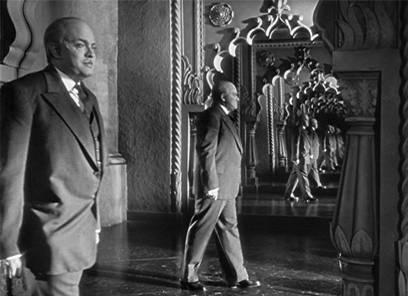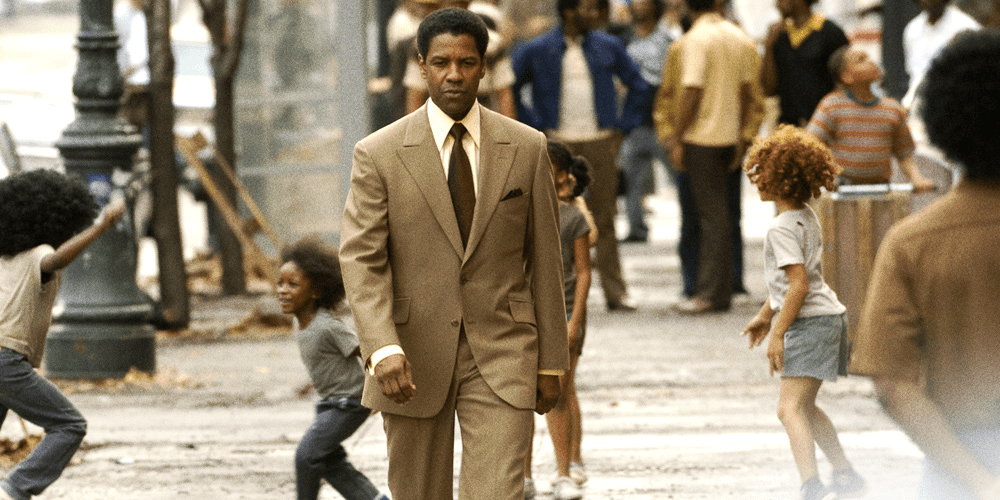Giants of Classic Films: The Exceptional Mind Trapped in a World of Their Own Creation
Bernie Langs
The misunderstood great mind standing firm and alone with their vision, genius, or obsession has long been a theme in film history. Many of the genre’s greatest masterpieces center around such figures and feature actors of legendary stature performing under the guidance of directors of equally singular talent.
In director John Huston’s 1956 take on Herman Melville’s nineteenth century classic novel, Moby Dick, the one-legged Captain Ahab, played by Gregory Peck, doesn’t appear to his crew until many days after the whaling boat has set out to sea. He can be heard late at night as the men sleep below deck, pacing and pounding the boards with the carved peg of a whale bone that substitutes for the leg severed by the white whale, Moby Dick. When Ahab finally appears in daylight, gazing out at them from above on the bridge, the sailors freeze into a state of motionless, silent awe. Ahab’s subsequent speech morphs into an initiation of these starstruck men on the obsessive quest for their captain’s revenge for the loss of his limb and the tearing of his soul—a mission to slay the whale and right the wrong brought upon Ahab, a man of mesmerizing power.
It’s challenging to fully understand the absolute grip Ahab holds over his crew. They possess an unquestioned loyalty so terrific that they follow his mad pursuit to their deaths, “save ye one,” the lone narrator, Ishmael (Richard Basehart). It is in Ahab’s seemingly more rational conversation that we are brought deeper into the unique mind behind the stark madness, as he makes clear his motivating, defeatist theology while conversing with his pious first first mate, Starbuck (Leo Genn):
Starbuck: To be enraged with a dumb brute that acted out of blind instinct is blasphemous.
Captain Ahab: Speak not to me of blasphemy, man; I’d strike the sun if it insulted me. Look ye, Starbuck, all visible objects are but as pasteboard masks. Some inscrutable yet reasoning thing puts forth the molding of their features. The white whale tasks me; he heaps me. Yet he is but a mask. ‘Tis the thing behind the mask I chiefly hate; the malignant thing that has plagued mankind since time began; the thing that maws and mutilates our race, not killing us outright but letting us live on, with half a heart and half a lung.

Later in the film, when the business of whaling is being ignored by Ahab, evident in his willingness to abandon harpooning to follow up on leads of where Moby Dick may be heading in the vast sea, the captain and his first mate are at it again:
Ahab: What is it, what nameless, inscrutable, unearthly thing is it; what cozening, hidden lord and master, and cruel, remorseless emperor commands me; that against all natural lovings and longings, I so keep pushing, and crowding, and jamming myself on all the time; recklessly making me ready to do what in my own proper, natural heart, I durst not so much as dare? Is Ahab, Ahab? Is it I, God, or who, that lifts this arm? But if the great sun move not of himself; but is as an errand-boy in heaven; nor one single star can revolve, but by some invisible power; how then can this one small heart beat; this one small brain think thoughts; unless God does that beating, does that thinking, does that living, and not I. By heaven, man, we are turned round and round in this world, like yonder windlass, and Fate is the handspike. And all the time, lo! that smiling sky, and this unsounded sea! …
Starbuck: …I say calmly back to thee, sir, I am against thee. But thee needn’t fear Starbuck. Let Ahab beware Ahab. Beware thyself, my captain.
In the final moments of the movie, Ahab is drowned, pinned to the white whale by harpoon ropes, and as Moby Dick crests, the dead captain’s arm rolls back and forth across his body, beckoning the crew of the Pequod to complete what he couldn’t accomplish, the death of the beast. As one crew officer orders the boats to return to the ship, crying out, “no more, no more of this!” ironically it is Starbuck who loudly demands they kill Moby Dick, not for revenge, but because they are whalemen and their trade is whaling. In the end, it is the God-fearing Starbuck who leads the crew and the ship itself to the bottom of the ocean.
Orson Welles appears as a fear-invoking preacher of spell-binding ability in Moby Dick in one of the few introductory scenes that take place on land in New Bedford, Massachusetts. Welles’s 1941 masterpiece, Citizen Kane, might be considered the first American film about a singular powerful man who stands above all not just because of wealth, but because of the strength of his dynamic personality. Charles Foster Kane makes his millions not as other robber barons of the early twentieth century did through sales of commodities or by building railways. Kane instead takes his monetary inheritance and increases it more than a thousand-fold through the spread of the printed word, by owning a thriving chain of newspapers and magazines. His exploitation of international turmoil is made as an educated and intellectually calculated choice. Headlines matter, the truth of the situation doesn’t, and knowing that, he holds the key to an expanding empire. Perhaps Kane may be “Trumpian” by grabbing success at the cost of truth and ethics, but he is also self-aware and engages personally with his editors and journalists, but only if he receives the required respect, which they willingly give.

Kane can take in the ugly truths about the world and himself on all subjects and ideas “save ye one”—he has a deaf ear to what prevents him from giving and taking love from others, even when his best friend (Joseph Cotton as Jedediah Leland) and his wife (Dorothy Comingore as Susan Alexander Kane), tell him forcefully to his face. He literally cannot hear and accept his greatest character flaw, perhaps because he knows it as something that he can’t change.

The famous keyword in Citizen Kane, “Rosebud,” is rarely uttered by the man, but when he does say it to himself, as recounted in the tales of his life told in flashbacks, the expression Welles brings to this man of money and influence melts to one of bitter loneliness and tired emotional reckoning. The source of his failure as a person is revealed in the final shot of the film, traced back to his unexpected childhood loss of innocence. “Rosebud”— even the richest man in the world with unquestioned power cannot escape the random cruelty of fate that spares not a soul.

There are dozens of movies based on the lives of real or fictional criminals leading mob gangs or organized crime syndicates. These men at the top gain and demand an “alternative” brand of respect that follows an unspoken “code” of honored admiration. In 2007’s American Gangster, Denzel Washington takes the lead on a story loosely based on Harlem’s Frank Lucas and his meteoric rise as a heroin kingpin in the late 1960s and 1970s. Washington’s Lucas is often merciless, yet unlike characters such as Kane and Ahab, he strives to be both gregarious and is naturally quick and witty. He transforms his drug business into a large family-run enterprise and buys a mansion for his poor mother, brothers, cousins, and other family to live in and enjoy. This is quite different from Kane’s massive and fear-invoking castle, Xanadu, which was less of a home than a medieval-like display of a Lord’s rights as master of his surrounding domain. Lucas is deferred to as the unquestioned leader through power of personality and his savvy business sense and serves as the cash cow for not only his relations, but for the neighborhood of Harlem itself at a time of social turmoil. The villainous dichotomy of Lucas loving his home city yet allowing a flood of heroin to destroy many of its most vulnerable inhabitants is never considered or understood by him as murderously wicked and morally duplicitous.
Lucas treks to Vietnam during the war to convince the jungle-based producers of the poppies for the drug to sell to him directly. This hidden source of the smuggled powder allows him to cut out the middlemen of the drug trade and is the key to his immense success and profits. As an African American, Lucas later concedes to doing business with a rich Italian mob boss only because he understands that they must be cut in or he’ll find his monopoly violently destroyed. Lucas is not impressed when that boss invites him to speak business at his huge house and property, never wavering in confidence or adjusting his tone in deference to this seasoned and extraordinarily wealthy gangster.
Many of us like to watch a movie by going into it recognizing the leading stars and then adapting to them in the role. Washington is so superlatively and always “Denzel,” yet he carries the unique ability of allowing his fans to quickly stop seeing him as such and only see his character Lucas, who is oddly very “Denzel”-like. Washington’s portrayal of Lucas is detailed and brilliant. In the end, as he faces conviction and personal defeat, we watch him slowly realize respect for another person for the first time since the death of his Harlem mentor, Bumpy Johnson in 1968, prior to his own rise in power. Lucas admires the quiet, messy, co-lead of the film, Newark, New Jersey detective Richie Roberts (Russell Crowe). Roberts never gives up throughout the movie as an honest cop trying his hardest each day to rid the poor streets of New Jersey of the plague of heroin by hunting down the suppliers. Roberts persists even when threatened by cops on the take who grab what they can when making a bust or demanding extortion payoffs. When Lucas is alone with Roberts to cut a deal to reduce the time he will be forced to serve in prison, he is awed by Roberts’ willingness to go after not only the drug criminals but also the criminals within the ranks of the police at all levels. The smile that crosses his face, that million-dollar grin that only Washington can give, is the moment that Lucas knows he has finally met a person worthy of respect, and it is the man who is going to be putting him behind bars.
Of Frank Lucas, Captain Ahab, and Charles Foster Kane, only Lucas is comfortable as a seemingly kind family man and a man of the streets and benefactor to his neighborhood. Yet, as Elizabeth Bennett says in Jane Austen’s Pride and Prejudice of the lying, duplicitous George Wickham, that despite all of his many charms of personality, “…yet, he is such a man.”
